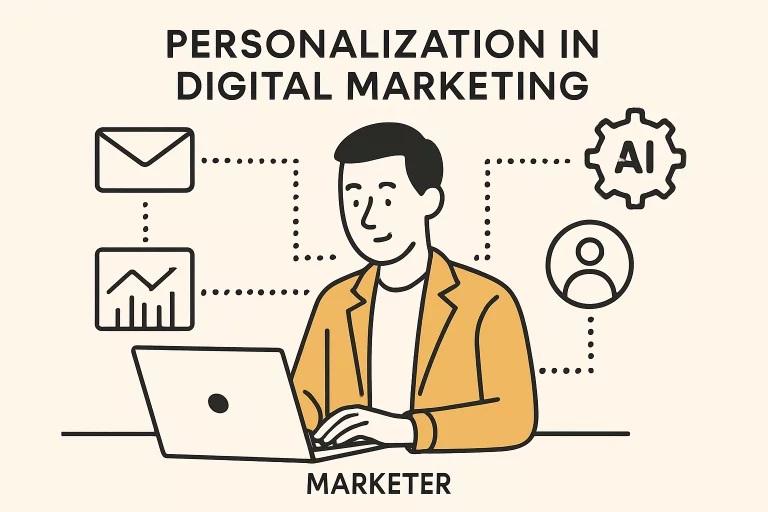Key Takeaways:
- Personalized marketing leverages data to deliver content tailored to individual consumer preferences.
- Implementing personalization requires robust data collection, effective segmentation, and the utilization of advanced technologies, such as AI.
- Successful personalization strategies can lead to increased customer loyalty and higher conversion rates.
In the fiercely competitive digital landscape, brands face mounting pressure to engage consumers in ways that are both compelling and meaningful. With digital marketing channels growing ever more crowded, generic or one-size-fits-all communication strategies no longer capture or sustain customer attention. Today’s consumers expect interactions that speak directly to their unique interests and needs, and they reward brands that deliver such experiences with their long-term loyalty and trust. As a result, personalized digital marketing has rapidly evolved from a buzzword to a best practice, enabling companies to cut through advertising noise using highly tailored content, messages, and offers. To remain competitive and visible in a saturated online ecosystem, businesses are investing in robust solutions, such as professional GMB optimization services, that help deliver targeted, value-driven messages to the right audiences at the right time.
As personalization shifts from being a differentiator to a consumer expectation, marketers must embrace a combination of data-driven insights and cutting-edge technologies. Beyond simply capturing attention, personalized strategies foster meaningful connections that nurture trust and advocate long-term engagement. Organizations that rise to meet these expectations stand to gain not just higher engagement rates, but deeper brand loyalty and improved reputation that can drive sustained growth for years to come.
Table of Contents
Understanding Personalized Digital Marketing
Personalized digital marketing can be defined as the practice of delivering communications—be it messages, offers, or content—that are meticulously aligned with the unique interests, demographics, preferences, and behaviors of individual consumers. What sets personalization apart from traditional, broad-reach advertising is its use of data: rather than pushing the same message to every consumer, personalized marketing harnesses data-derived insights from every touchpoint to craft content as unique as the recipient. Examples include smart, dynamic emails that recommend products similar to a customer’s previous purchases, landing pages that rearrange banners and text based on user browsing history, or apps that greet users by name and remember their favorite services. These experiences are designed not only to drive immediate engagement and conversion but also to create an ongoing sense of recognition and relevance for every interaction.
Benefits Of Personalization
The advantages of customized digital marketing are substantial, offering brands myriad ways to stand out and capture the hearts and wallets of target customers:
- Enhanced Customer Engagement: When audiences encounter messaging that resonates with their own desires and speaks to their individual lifestyles, they are far more likely to click, read, share, or make a purchase. This results in measurable increases in open rates, click-through rates, average session duration, and other key engagement metrics. Consumers view personalized content as relevant and respectful, which builds positive brand associations over time.
- Increased Conversion Rates: The power of personalized recommendations, exclusive offers, and timely reminders cannot be overstated. By targeting offers to segments most likely to buy—and delivering those offers at optimal moments—personalization consistently leads to higher sales and stronger calls to action. Brands using real-time remarketing or targeted abandoned cart emails, for example, regularly report impressive improvements in conversion rates.
- Improved Customer Loyalty: When a brand takes the time to remember a customer’s preferences, anticipate their needs, and treat them as individuals instead of anonymous data points, loyalty deepens. Personalized experiences not only boost repeat purchases but also inspire satisfied customers to become vocal advocates, spreading word of mouth that brings in new business organically and at a lower cost.
Implementing Personalization Strategies
To achieve the benefits of personalization, businesses must adopt a systematic, multi-step approach. True personalization is not achieved with a single campaign, but through an ongoing cycle of data collection, segmentation, optimization, and technology leverage. Key steps in this journey include:
- Data Collection and Analysis: At the heart of all personalization is high-quality customer data. Brands should collect information from every digital touchpoint, including website analytics, purchase records, social media engagement, email interactions, surveys, and more. Advanced analytics platforms can help consolidate disparate datasets into comprehensive, actionable customer profiles, with privacy and consent as top priorities.
- Customer Segmentation: Analysis alone is not enough. Marketers must break down audiences into specific, meaningful segments based on common characteristics such as demographics, purchase behaviors, psychographics, life stage, or even real-time actions. Effective segmentation enables targeted messaging that resonates deeply with each group, significantly enhancing campaign efficacy.
- Utilize Advanced Technologies: Artificial intelligence, machine learning, and automation tools are game-changers in personalization. AI can detect patterns at scale, predict customer behaviors, and dynamically serve personalized content. For instance, automated algorithms can instantly generate product recommendations, tailor landing pages, or time promotions to reach customers at just the right moment, giving even smaller businesses the power once reserved for global giants.
Challenges In Personalization
Despite the impressive benefits, executing a successful personalization strategy is not without hurdles and risks:
- Data Privacy Concerns: As brands collect and use more customer data, privacy becomes a critical consideration. Consumers are increasingly aware of how their information is used and are quick to withdraw trust if their data is mismanaged. Laws such as the GDPR and CCPA require businesses to obtain explicit consent, clearly disclose their data practices, and provide users with control over their information—failing to do so risks reputational and financial damage.
- Resource Intensiveness: Creating and continually updating personalized experiences for multiple audience segments requires significant investments in time, creativity, skilled personnel, and technology. Smaller businesses, in particular, may struggle to achieve true personalization at scale without the right platforms and automation tools.
- Balancing Personalization and Intrusiveness: A delicate balance exists between being helpful and overstepping boundaries. When personalization is too explicit or driven by data that feels overly sensitive or intrusive, consumers can feel surveilled or manipulated. This not only erodes trust but can result in lost business or public backlash. Brands must always prioritize ethical data usage and respect user boundaries.
Future Trends In Personalization
As technology and data science continue to evolve, the future of digital marketing personalization looks even more promising—and complex:
- Hyper-Personalization: Brands are moving beyond broad segments to deliver hyper-personalized experiences, utilizing real-time contextual data, including weather, device, location, and even predictive analytics, to tailor communications to the precise moment a consumer interacts. Hyper-personalized ads and offers are expected to be more common, resulting in messaging that feels almost bespoke in its timing and content. For those interested in a closer look at both the positive impact and challenges of hyper-personalization, see The Power (and Peril) of Hyper-Personalized Ads in Digital Marketing.
- Omnichannel Personalization: In a fragmented digital world, the ability to offer a cohesive, personalized brand experience across every touchpoint—web, mobile, email, social, and even offline channels—will be the gold standard. This requires robust data integration systems and unified storytelling, ensuring customers feel recognized and valued regardless of where or how they interact with the brand.
- AI-Driven Insights: Artificial intelligence will become even more integral to the personalization process. AI is rapidly evolving from merely identifying trends to anticipating individual needs before customers express them, such as proactively addressing issues or offering relevant solutions. This predictive power adds a new dimension to brand-customer relationships, building loyalty and satisfaction through seamless, anticipatory service.
As privacy considerations evolve in tandem with personalization technologies, the tension between relevance and data respect will remain a central theme for digital marketers. Brands must deliberately navigate this dynamic, striving to offer value without overstepping boundaries or compromising consumer trust. For practical strategies and insights on navigating this increasingly complex environment, see How Personalization and Privacy Are Shaping How Brands and Retailers Connect with Consumers. As digital marketing continues to evolve, brands that combine smart technology, strategic data use, and a deep respect for the consumer will be best equipped to connect, convert, and thrive well into the future. Striking the right balance between innovation and integrity will define the next wave of successful marketing. Consumers are becoming more discerning, rewarding brands that demonstrate transparency and ethical use of their data. By fostering trust and prioritizing meaningful interactions, companies can build lasting relationships in an increasingly privacy-conscious world.
Conclusion
Personalized digital marketing is no longer a luxury—it is a necessity in today’s experience-driven marketplace. As consumer expectations rise and technology evolves, brands must move beyond generic messaging to deliver communications that are timely, relevant, and deeply tailored to individual preferences. While implementing personalization comes with its own set of challenges, from data privacy concerns to resource constraints, the potential rewards in terms of customer engagement, loyalty, and long-term growth are too significant to ignore. By embracing smart technologies, ethical data practices, and a customer-first mindset, businesses can not only stand out in a crowded digital landscape but also foster authentic, lasting relationships that drive sustained success.








No Comments